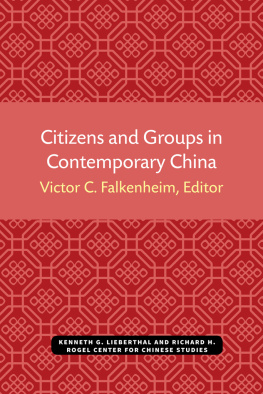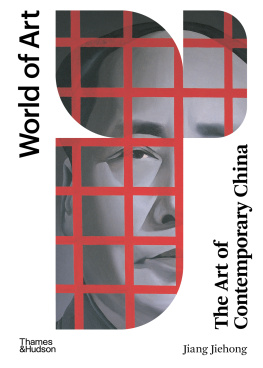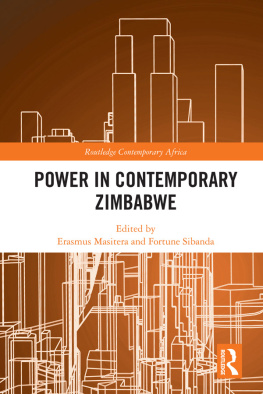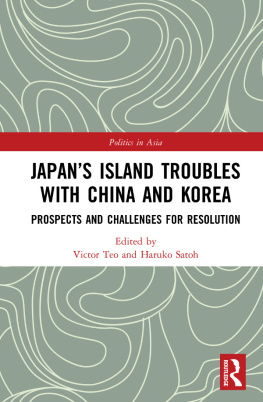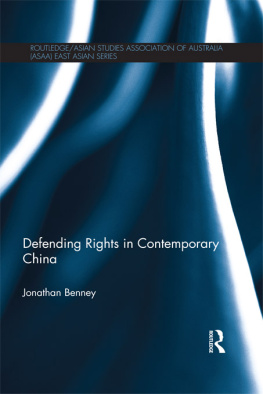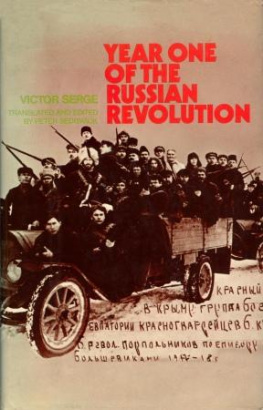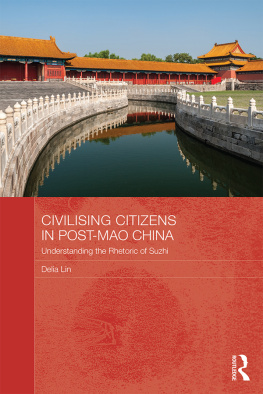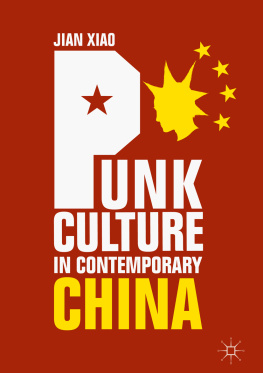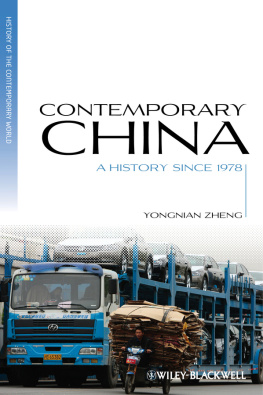Victor C. Falkenheim - Citizens and Groups in Contemporary China
Here you can read online Victor C. Falkenheim - Citizens and Groups in Contemporary China full text of the book (entire story) in english for free. Download pdf and epub, get meaning, cover and reviews about this ebook. year: 2020, publisher: Kenneth G. Lieberthal and Richard H. Rogel Center for Chinese Studies, genre: Politics. Description of the work, (preface) as well as reviews are available. Best literature library LitArk.com created for fans of good reading and offers a wide selection of genres:
Romance novel
Science fiction
Adventure
Detective
Science
History
Home and family
Prose
Art
Politics
Computer
Non-fiction
Religion
Business
Children
Humor
Choose a favorite category and find really read worthwhile books. Enjoy immersion in the world of imagination, feel the emotions of the characters or learn something new for yourself, make an fascinating discovery.
- Book:Citizens and Groups in Contemporary China
- Author:
- Publisher:Kenneth G. Lieberthal and Richard H. Rogel Center for Chinese Studies
- Genre:
- Year:2020
- Rating:5 / 5
- Favourites:Add to favourites
- Your mark:
- 100
- 1
- 2
- 3
- 4
- 5
Citizens and Groups in Contemporary China: summary, description and annotation
We offer to read an annotation, description, summary or preface (depends on what the author of the book "Citizens and Groups in Contemporary China" wrote himself). If you haven't found the necessary information about the book — write in the comments, we will try to find it.
Citizens and Groups in Contemporary China — read online for free the complete book (whole text) full work
Below is the text of the book, divided by pages. System saving the place of the last page read, allows you to conveniently read the book "Citizens and Groups in Contemporary China" online for free, without having to search again every time where you left off. Put a bookmark, and you can go to the page where you finished reading at any time.
Font size:
Interval:
Bookmark:

The University of Michigan Center for Chinese Studies
Michigan Monographs in Chinese Studies
Volume 56
Citizens and Groups in Contemporary China
edited by Victor C. Falkenheim
Ann Arbor
Center for Chinese Studies
The University of Michigan
1987
Open access edition funded by the National Endowment for the Humanities/Andrew W. Mellon Foundation Humanities Open Book Program.
Copyright 1987
by
Center for Chinese Studies
The University of Michigan
Library of Congress Cataloging in Publication Data
Citizens and groups in contemporary China.
Includes bibliographies.
1. Pressure groupsChinaAddresses, essays, lectures. 2. Political participationChina Addresses, essays, lectures. 3. ChinaPolitics and government1949-Addresses, essays, lectures. I. Falkenheim, Victor C., 1940.
JQ1514.P7C58 1985322.43095185-114987
ISBN 0-89264-065-0ISBN 0-89264-066-9 (pbk.)
Printed in the United States of America
Cover by Eric M. Ernst
ISBN 978-0-89264-065-2 (hardcover)
ISBN 978-0-89264-066-9 (paper)
ISBN 978-0-472-12788-7 (ebook)
ISBN 978-0-472-90184-5 (open access)
The text of this book is licensed under a Creative Commons Attribution-NonCommercial-NoDerivatives 4.0 International License: https://creativecommons.org/licenses/by-nc-nd/4.0/
Contents
JOHN P. BURNS is Associate Professor of Political Science at the University of Hong Kong.
LOWELL DITTMER is Associate Professor of Political Science at the University of California at Berkeley.
VICTOR C. FALKENHEIM is Associate Professor of Political Science and Chairman of the Department of East Asian Studies at the University of Toronto.
MERLE GOLDMAN is Professor of History at Boston University.
HARRY HARDING, JR. is Senior Fellow in the Foreign Policy Studies Program at the Brookings Institution.
RICHARD P. SUTTMEIER is Henry Bristol Professor of International Affairs at Hamilton College.
ANDREW G. WALDER is Assistant Professor of Sociology at Columbia University.
LYNN T. WHITE III is Professor of Politics at Princeton University.
Victor C. Falkenheim
This volume began with two symposia held in 1977 and 1978. The first, a workshop on The Pursuit of Interest in China, was held in August 1977 at the University of Michigan, and was organized by Michel Oksenberg and Richard Baum. It was supported by a grant from the Joint Committee on Contemporary China of the Social Science Research Council and the American Council of Learned Societies, using funds provided by the Andrew Mellon Foundation. Its principal goal was to use detailed case studies to explore the relevance of interest group approaches to the study of Chinese politics. The second, a panel organized by the editor for the 1978 Chicago meeting of the Association of Asian Studies, sought to apply participatory approaches to the role of social groups in the Chinese political process. The striking degree of overlap in the focus, methodology, and participants in both meetings suggested to a number of the paper writers that there was a need for a more eclectic approach which would focus simultaneously on individual and group actors. The recognition that a volume based on such an approach might serve the needs of students and scholars seeking to examine the dynamics of informal influence and power in China was the stimulus for publishing the studies presented here in book form.
Three of the chapters in the current volume were originally drafts prepared for the 1977 workshop; two were initially presented at the 1978 meeting in Chicago. Three other chapters were commissioned later as the volume took shape through our correspondence and meetings of 1980 and 1981. All have been revised to take account of the dramatic revelations of the post-Mao years.
Citizen and Group Politics in China:
An Introduction
Victor C. Falkenheim
The first systematic exposition of interest group approaches to the study of policy-making in Marxist-Leninist polities appeared almost two decades ago. Since that time, periodic challenges notwithstanding, such approaches have become almost universally regarded as essential tools of substantive policy analysis, reflecting the increasing importance of group activity in modernizing socialist systems.
Paradoxically, interest group approaches, though first applied to the post-Stalin U.S.S.R., quickly took root in Chinese studies, despite the significant gap between China and the Soviet Union in stage of revolutionary development and in economic structure. Early scholarship on the post-1949 period in China tended to favor totalitarian or mobilization paradigms, reflecting the vigorous transformative programs being undertaken by the youthful post-revolutionary regime. But, as interest group approaches gained influence in the broader field of communist studies, developments in China prepared the ground for their ready acceptance. The collapse of the Great Leap Forward (1958-60) and the states subsequent retreat in the face of grass roots opposition to radical initiatives revealed the limits of monolithic models of state power. The sharp intra-elite political cleavages that subsequently emerged shattered images of a unified senior leadership. In response, scholars moved toward the use of a variety of conflict models, a shift which was accelerated by the onset of the Cultural Revolution in the late 1960s. The extent of the open
Three kinds of studies resulted from these changing perceptions and approaches. One focused on the policy-making process and sought to explore the impact of intra-elite cleavages on policy continuity and change. These studies confirmed the importance of focusing on interest politics, established the critical importance of the bureaucratic setting of policy formulation and implementation, and clarified the significance of the prevailing pattern of elite conflict in shaping interest politics within the bureaucratic structure and in society. The validity of these insights has been amply confirmed by the explosion of interest politics in the 1980s in response to the reform initiatives of Dengs modernizing coalition.
Despite these advances, no real consensus has been reached on the role of interests in the policy-making process. In particular, considerable skepticism persists regarding the influence of broad social groups. Though most analysts agree that focusing on elite participation at higher levels in the political system was useful, they disagree on the question of how such individual, factional, or organizational interest articulation is structured. Nor has agreement been reached on how best to describe or conceptualize the pattern of state-society
Finally, little agreement has been achieved regarding the most appropriate models for discussing the long-term transformational and development processes underway. What models best take account, for example, of the changing pattern of group politics today? It seems clear that the current more visible and vigorous advocacy of social and economic interests and the more accommodating posture of the regime are in part a reflection of short-term liberalizing trends, but are equally linked to the major generational and systemic transition ahead. As the Chinese seek to devise new institutional forms to accommodate the changing pattern of group and individual demands in the context of eroding doctrinal allegiance, comparative and longterm perspectives are needed to understand those changes.
The authors of the following chapters seek to examine these questions and explore how demands at the grass roots are brokered into the policy process, how choices are shaped at the middle level, and how competing demands are reconciled at the top. While differing in our concepts and frameworks, we agree that the analysis of interests, influence, and policy requires a historically textured, multilevel focus, exploring not only activities of social groups and aggregates, but also focusing on the vertical links which tie grass roots participation by individuals to the strategies of middle-level administrators and to the critically important policy and loyalty groups at the apex of the system. Skilling and Griffith, in their pioneering volume on interest groups in the U.S.S.R., deliberately eschewed a direct concern with social groups and elite factions. We, however, prefer to emphasize the role of social aggregates, professional groups, and bureaucratic interest groups at the base and intermediate levels of the structure, exploring the interactions among them.
Font size:
Interval:
Bookmark:
Similar books «Citizens and Groups in Contemporary China»
Look at similar books to Citizens and Groups in Contemporary China. We have selected literature similar in name and meaning in the hope of providing readers with more options to find new, interesting, not yet read works.
Discussion, reviews of the book Citizens and Groups in Contemporary China and just readers' own opinions. Leave your comments, write what you think about the work, its meaning or the main characters. Specify what exactly you liked and what you didn't like, and why you think so.

